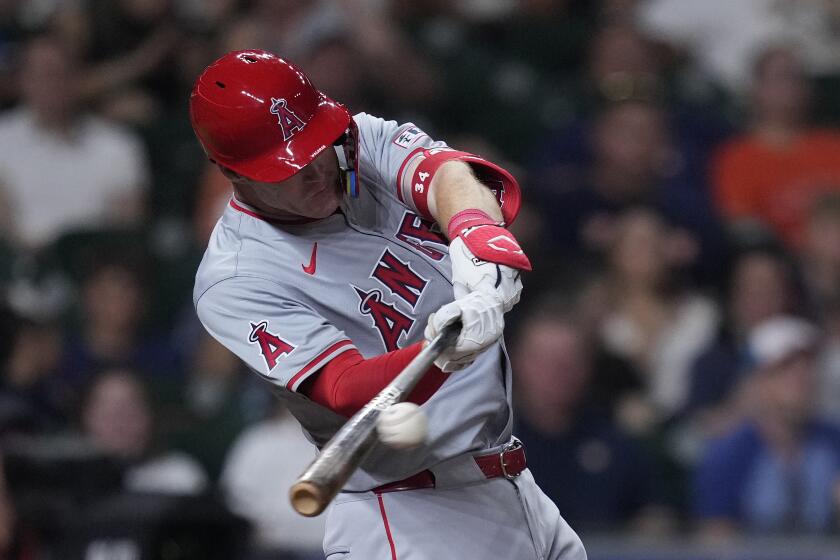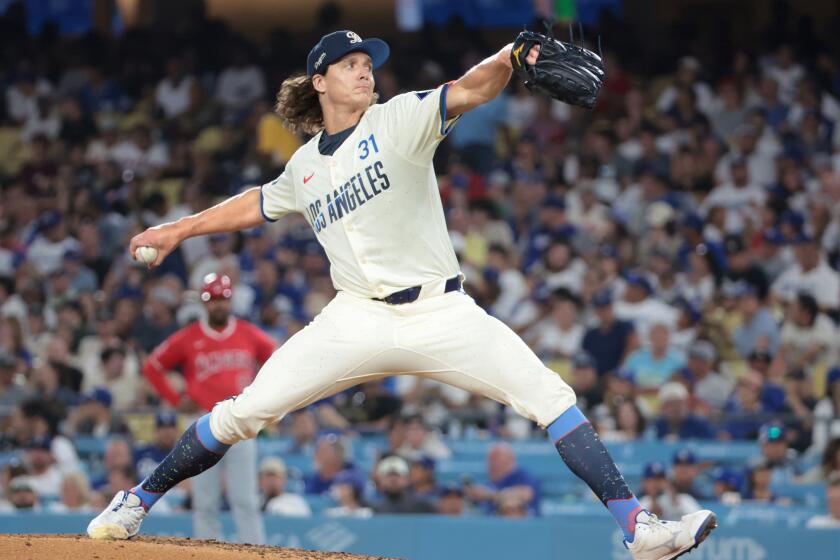Braves get swatted by Cardinals with infield fly rule
A week and a half after a blown call by replacement referees on “Monday Night Football” sparked a national outcry, baseball’s umpires ignited similar outrage Friday with a controversial call that marred the St. Louis Cardinals’ 6-3 victory over the Atlanta Braves in the National League wild-card game at Atlanta.
Trailing, 6-3, with runners on first and second in the eighth inning, the Braves appeared to catch a break when an Andrelton Simmons fly ball to short left field dropped between Cardinals shortstop Pete Kozma and left fielder Matt Holliday after a mix-up over who had it.
A crowd of 52,631 roared, assuming the bases would be loaded with one out and Brian McCann, a .339 hitter with nine grand slams in 109 at-bats with the bases loaded, on deck.
But just before the ball dropped, left-field umpire Sam Holbrook signaled an automatic out because of the infield fly rule, which is designed to prevent a team from intentionally dropping a popup in order to get extra outs with more than one runner on base.
Atlanta Manager Fredi Gonzalez argued vehemently, claiming the ball fell a good 50 feet beyond the infield and could not have been caught “by an infielder with an ordinary effort,” which the rule requires.
Fans littered the field with hundreds of plastic bottles and other garbage, causing a 19-minute delay, during which Gonzalez filed an official protest that was later denied. Infield-fly rulings are not reviewable by instant replay.
Both runners advanced on the play, and McCann drew a walk off St. Louis closer Jason Motte to load the bases.
But Michael Bourn struck out to end the inning, and the Cardinals held on to advance to the NL division series against Washington.
“I was arguing that it was not an ordinary effort,” Gonzalez said. “I thought the shortstop had to go way out there to make a play, and I think we’ve got to take into account the crowd, 50,000 people yelling, and I thought there was some miscommunication between Holliday and Kozma I took a glimpse at the replay. I thought we had a legitimate beef.”
Major League Baseball, however, denied the protest.
“I talked to Fredi after the game, and it’s unusual circumstances based on this being a one-game playoff and having to wait 24 hours for a written report,” said Joe Torre, MLB’s executive vice president for baseball operations.
“It didn’t make sense. I spoke to them, asked them what they were basing their protest on, and I ruled basically to disallow the protest based on the fact that it was an umpire’s judgment call.”
After the game, TBS in-studio analyst Dennis Eckersley said, “If anything was done wrong here, he called it too late.” Partner David Wells was more outspoken.
“There’s flopping in baseball now, I kid you not, because that’s just a terrible call,” Wells said. “It was late, for one thing. Holliday was drifting, and the ball was five feet away from the shortstop. It was a botched call by the umpire.”
All six umpires convened, and afterward, Holbrook told reporters, “Every man to a ‘T’ agreed with the call.”
While the defending World Series champion Cardinals celebrated with champagne in their clubhouse, the Braves were left with the bitter disappointment of a critical call that didn’t go their way.
But they also had themselves to blame. They committed three errors, including one by Chipper Jones, the third baseman who, in his last big league game, threw away a potential double-play grounder that paved the way for the Cardinals’ three-run fourth inning. Kris Medlen, undefeated in his previous 23 starts, took the loss.
“We need to look at ourselves in the mirror,” said the 40-year-old Jones, who is retiring. “Three errors cost us the game, mine probably being the biggest. I’m not willing to sit here and say that call cost us the game.”
mike.digiovanna@latimes.com
twitter.com/MikeDiGiovanna
DiGiovanna reported from Los Angeles
More to Read
Go beyond the scoreboard
Get the latest on L.A.'s teams in the daily Sports Report newsletter.
You may occasionally receive promotional content from the Los Angeles Times.











